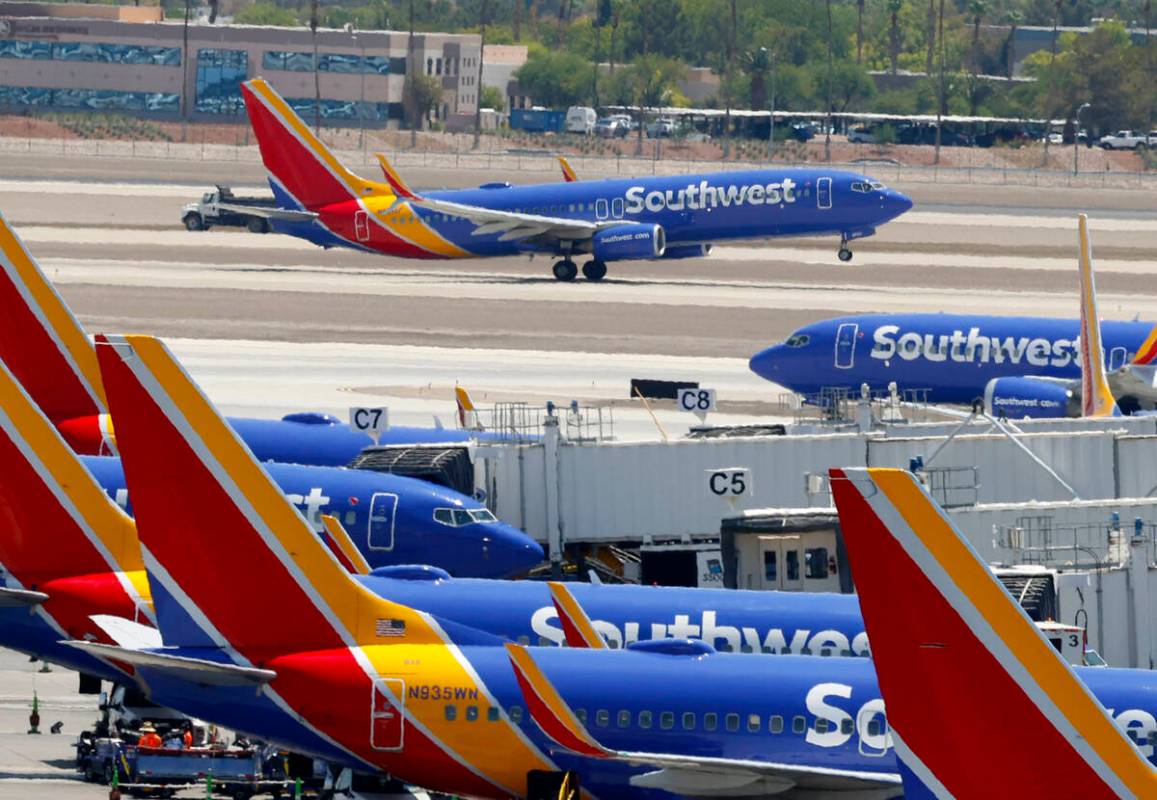Southwest will assign seats on flights, breaking 50-year tradition

Southwest Airlines will begin assigning seats on its flights next year and launch late-night “red-eyes” from Las Vegas to Orlando, Florida, and Baltimore in February, the company announced Thursday.
The Dallas-based airline, the busiest commercial air carrier at Harry Reid International Airport, earlier this year had hinted that change was coming to its decades-old boarding process, which has differentiated Southwest from other airlines.
Ultimately, the airline, under pressure from investors to provide better financial returns, made the decision in a bid to produce additional revenue streams and strengthen financial performance.
In addition to assigning seats, the airline will reconfigure the cabins of its 800-jet fleet to offer some seats with greater legroom and sell those at a higher price.
Assigned seating is expected to begin next year. In an earnings conference call Thursday morning, executives said additional details about the transition to assigned seating would be explained in a presentation to investors in September.
Red-eyes start in February
But Southwest’s plans for red-eye flights are set and tickets are already for sale: Beginning Feb. 14, the airline will fly nonstop from Reid International to Orlando and Baltimore, the first of five routes the airline tabbed for late-night flying.
A Southwest spokesman said more red-eye routes from Las Vegas are expected to be unveiled in future months.
There’s no indication whether Southwest intends to offer those tickets at lower fares, a tactic commonly used by other airlines.
Southwest said the decision to change to assigned seating didn’t come lightly. The airline conducted months of research and determined from surveys that 80 percent of its customers — and 86 percent of “potential” customers — want an assigned seat. It said open seating is the top reason that travelers stop flying Southwest and choose another airline.
Southwest customers arriving at Reid Thursday morning said they felt it was inevitable that the airline would jettison its open-seating model.
‘A radical departure’
“It’s kind of a radical departure for Southwest,” said Cheryl Nelson, who arrived Thursday on a Southwest flight from Portland, Oregon.
“I usually fly Alaska (Airlines) so I like assigned seating, so I think it’s great,” she said. “I know when you get Group C, you may not get to sit together with friends or family. With assigned seats, you don’t have that additional stress of knowing whether you’ll be able to sit together.”
Las Vegas resident Dan Burgess said assigned seating will eliminate the frustration of some passengers who try to manipulate the system.
“I’ve seen people board a Southwest flight and try to hold seats for their friends and some try to hold an entire row,” he said. “People pay for A-list boarding and when they get on they try to save an entire row of seats. I’ve seen couples get on and one sits at the window and the other on the aisle. So it kind of counters that abuse of the system, I think.”
Melissa Macklin, who flew in from Houston, said she was surprised by Southwest’s assigned-seating move.
“It makes them the same as every other airline I guess,” said Macklin, who said she’s a Southwest stock shareholder.
She indicated she’s interested in hearing some of the details of the plan.
Amanda Belarmino, an assistant professor at UNLV’s William F. Harrah College of Hospitality, said the new system would reduce the stress of people having to log in to secure their place in line for boarding.
Most airlines assign each passenger to a seat when they buy a ticket. Southwest requires customers to check in exactly 24 hours before departure unless they pay extra to guarantee a better place in the boarding line.
“Southwest was the only airline with the open seating policy, which I think they did to give them a competitive advantage,” Belarmino said. “However, this causes issues with families traveling together and creates some chaos at the gate.”
Race to the line
Belarmino described the ritual of racing to secure the best place in line.
“Many people are dropping everything they are doing to be on their phones or computers 24 hours to the minute to get the best place,” she said. “The assigned seating will prevent these issues and allow them to be more competitive with other airlines where seating is assured.”
Southwest’s unusual boarding process started decades ago as a way for the airline to save money by reducing the amount of time it took for a plane to land, load new passengers, and take off again — turn time, as it is called in the business.
Southwest has said its ability to turn planes quickly usually makes it possible to add one more flight per day per aircraft. Those efficiencies have kept Southwest profitable over the years.
The addition of redeye flights will also extend the flight day for Southwest planes. The airline said it has enough pilots, flight attendants and ground personnel to manage the extra flying.
The changes in seating policy and redeye flights come as Southwest is under pressure from hedge fund investor Elliott Investment Management. The hedge fund argues that the airline lags rivals in financial performance and has failed to change with the times. It wants to replace CEO Robert Jordan and Chairman Gary Kelly.
In an earnings conference call Thursday morning, Jordan said Southwest has no intention of changing another of the features that sets itself apart from other carriers — permitting passengers to check up to two suitcases without an added charge.
Contact Richard N. Velotta at rvelotta@reviewjournal.com or 702-477-3893. Follow @RickVelotta on X. Associated Press contributed to this report.